Since we’ve been raising alpacas, I’ve been asked the same questions time and time again. Can I raise alpacas with my llama, sheep, goats, donkeys, horses, cattle, pigs, chickens, dogs, and cats?
The question would seem straightforward, however, you have uniformed hobby farms raising these species together not realizing the mental, physical, and genetic issues they are introducing to their livestock. These same hobby farms are quick to educate others in Facebook groups without having the science of animal behavior and husbandry behind their answers.
I’ve grown frustrated with this approach, so I thought it would be best to document the answer in a blog post and put a little science behind my answers. Keep in mind these are my opinions and they are based on the research I’ve performed.
Other people will have their own opinions and they will be quick to offer examples of multiple species living with alpacas without issue. I’m sure these examples are true to the best of their owners’ knowledge. However, unless you have cameras to watch behavior when you are not around, you truly don’t know if things are as calm and quiet as you believe. You also don’t know when instinct will kick in and your beloved donkey, goat, or dog shifts from acceptable behaviors to dangerous actions.
For all those who have had positive experiences, we know there are many who have not. And unfortunately, everything seems fine until it isn’t. And by the time that happens, you have an alpaca down due to physical harm or illness. It’s simply too late to save the alpaca.
I choose to not take those risks.
In General, Can Alpacas Live With Other Animals?
Alpacas are very docile creatures, and they are accepting of many things. But that does not mean you should raise them in the same pasture or paddock with other livestock.
When you introduce an alpaca to other species and comingle them together, you can quickly run into health and mental issues.
At a high level, alpacas living with other animals exponentially increases the risk of:
- Parasites
- Disease
- Illness due to one animal eating food or minerals suited for another animal
- Physical aggression
- Accidental injuries
- Inappropriate mating
- Crossbred offspring
- Mental health issues
Let me cover the most common animals one by one, so I can provide some details on why we believe it is generally best to keep alpacas segregated from other livestock and family pets.
Can Alpacas Live With Llamas?
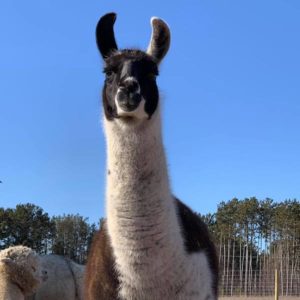 Yes, alpacas can successfully live with llamas of the same sex. We have one female llama who lives in harmony with our female alpacas.
Yes, alpacas can successfully live with llamas of the same sex. We have one female llama who lives in harmony with our female alpacas.
We rescued Lucy the llama about six months ago. She was escaping her former home and the local sheriff kept having to get involved because she was roaming the country roads. It wasn’t that Lucy was being bad, she was just lonely.
Lucy was living with a geriatric horse and a goat or donkey. She kept walking over the low fencing to look for other camelids. When we went to rescue she was closed up in a dark barn all by herself. When she came out, she was shaking. We had no idea what we were getting ourselves into. We loaded Lucy into the trailer and prayed things would work out.
When we arrived home with Lucy we put her in a separate pen so we could do fecal testing on her to check for parasites. Even though she was technically alone, she could see the alpacas were near and she was at ease. She could see her camelid cousins (the alpacas) and it was as if she knew she was in the right place.
After her fecal tests came back clear, we released her into gen pop (the general alpaca population). Our female alpacas immediately accepted her and Lucy was so happy to be with other camelids. Today Lucy is the star of our tours and is an agritourism rockstar.
The takeaway of that story is alpacas and llamas can easily coexist if you keep females with females and males with males. If you do not separate genders, you’ll end up having medical issues and you’ll produce a mix of alpaca and llama, which is called a huarizo.
Can Alpaca Live With Donkeys?
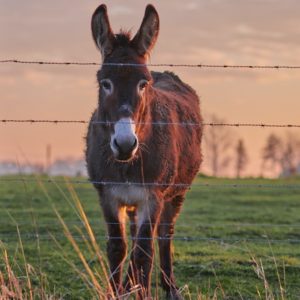 Raising alpacas with donkeys is not recommended.
Raising alpacas with donkeys is not recommended.
My sister had a donkey named Cookie who was adorable. Cookie was loving and graved human attention. Cookie made me want to raise donkeys.
That said, Cookie is a donkey, and donkeys can bully, pick up, push, shake, and kick alpacas. This can cause the alpaca significant damage or death.
Donkeys also carry parasites, viruses, and bacteria that can cause illness and death in alpacas. These include liver fluke, lungworms, and herpesvirus 1 (EHV-1).
Donkeys can be just as lovable as alpaca and I can see why hobby farmers would want to raise both. If you want to raise both donkeys and alpaca, we recommend you use fencing to segregate them into separate paddocks and shelter areas.
Can Alpacas Live With Sheep?
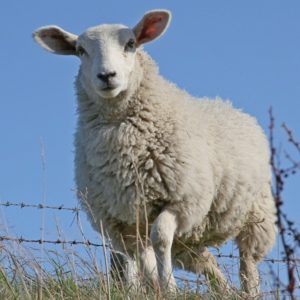 Raising alpacas with sheep is not recommended.
Raising alpacas with sheep is not recommended.
In certain geographical areas, alpacas are often used as protection of sheep, but this does not come without issue. From bulling and mounting to copper sensitivity and overexposure, comingling brings risks.
Sheep and alpaca share common illnesses, parasites, and bacteria. Some of these include liver fluke, Johne’s disease, Q fever, and soremouth.
If you want to raise both sheep and alpaca, it is best to use fencing to segregate them into separate paddocks and shelter areas.
Can Alpacas Live With Goats?
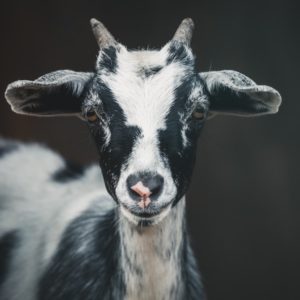 Raising alpacas with goats is not recommended.
Raising alpacas with goats is not recommended.
Similar to other livestock in this list, goats present behavioral risks when housed with alpacas. Goats like to climb, and this includes climbing into hay feeders. This can lead to a mess, as well as it can leave behind goat feces. Goats can also get feisty, which can lead to butting and using their horns in play or fights.
Copper sensitivity is also an issue since alpacas are sensitive to cooper. Goat minerals will contain copper, which will be toxic to the alpacas if they can access this mineral.
Goats and alpacas carry similar parasites, but not similar habits with dung piles. As the goats poop randomly in the pasture, they can leave behind feces that can pass on diseases such as liver fluke, Johne’s disease, and soremouth.
Goats are fun-filled, funny animals. They are an attraction just like the fluffy and lovable alpaca. If you want to raise both goats and alpaca, it is best to use fencing to segregate them into separate paddocks and shelter areas.
Can alpaca live with horses?
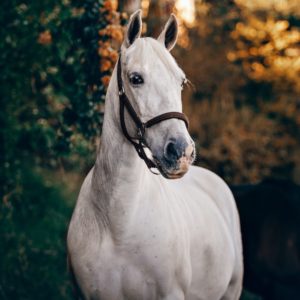 Raising alpacas horses in the same paddock and pasture is not recommended.
Raising alpacas horses in the same paddock and pasture is not recommended.
Horses are smart, majestic creatures who can also be headstrong. They can bully and kick alpacas. But unlike the alpaca, a horse kick comes with a mighty force. Whether the kicking is done by accident or intentionally, it can cause the alpaca significant damage or death.
Horses also carry parasites, viruses, and bacteria that can cause illness and death in alpacas. These include strongyles, salmonella, herpesvirus 1 (EHV-1), liver fluke, lungworm, and streptococcus zooepidemicus.
Horse and alpacas are best raised when they share a fence line. Keep them close, but far enough away that their behavior is in check and the feces doesn’t cross over.
Can Alpacas Live With Cattle?
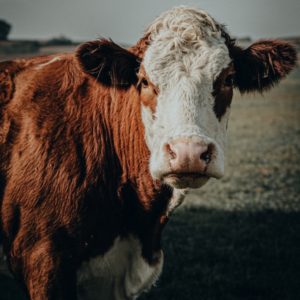 This question is far less common than the others, but it does still get asked. We do not recommend raising alpacas with cattle.
This question is far less common than the others, but it does still get asked. We do not recommend raising alpacas with cattle.
Cattle carry a large number of diseases and parasites that will significantly impact an alpaca’s health. Johne’s disease, lungworm, and bovine viral diarrhea virus (BVDV) are all health concerns. Ostertagia sp. is a parasite that is shared between alpacas and cows, which brings even more opportunities for illness.
If calf starter is used around alpacas, the risk of illness grows further. Calf starter can cause abortion in pregnant alpacas. A note here is calf starter is not the same thing as the name-brand Calf-Manna. Many alpaca farmers use Calf-Manna with success. The two products have different ingredients.
Can Alpacas Live With Pigs?
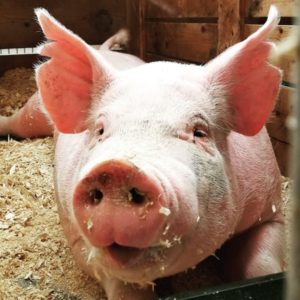 While pigs don’t share common parasites with alpacas, raising alpacas with pigs is not recommended.
While pigs don’t share common parasites with alpacas, raising alpacas with pigs is not recommended.
Pigs are just a different type of livestock. Pigs can be prone to consume smaller animals, they’ll uproot fields and cause havoc on pastures, and pigs can cause physical harm to the alpaca in play or defensive actions.
I don’t know why you would want to raise pigs and alpacas together, but regardless of benefits or reasons, we do not recommend raising alpacas with pigs. It is just not worth the risk.
Can Alpacas Live With Chickens?
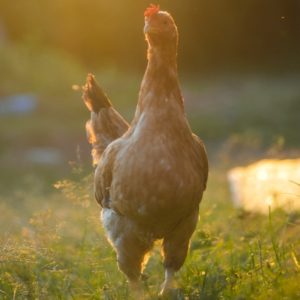
This is one area where I will say use discretion. We believe the benefit the chickens offer our alpaca herd outweighs the risk they present.
We allow our chickens to access the alpaca paddocks to clean flies and larvae out of the dung piles. Doing so significantly cuts down on the fly population.
We take care to not allow the chickens to roost in the alpaca barns or paddocks. The chickens typically only visit the alpaca paddocks to eat up the unwelcome critters, then they head back to their own chicken coop to bed for the night.
We’ve had no issues with this practice, but I think this is because both the alpacas and the chickens have separate living areas and they don’t share the shelter, water, or food. Our chickens are in to grab their snacks and then they are back out.
Can Alpacas Live With Cats?
 I love cats and often feel alpacas have similar personalities to cats. I’d love to have barn cats to reduce the mice population, but I do worry about comingling cats and alpacas because it does offer some health risk.
I love cats and often feel alpacas have similar personalities to cats. I’d love to have barn cats to reduce the mice population, but I do worry about comingling cats and alpacas because it does offer some health risk.
Toxoplasmosis gondii is a parasite responsible for toxoplasmosis, which is something pregnant women are always warned about when they own indoor cats. An alpaca can be exposed to the Toxoplasmosis gondii by ingesting hay contaminated with an infected cat’s feces. This exposure can cause abortion in the last trimester of an alpaca’s pregnancy. Keeping young cats out of the barn, hay source, and pasture will reduce the spread of Toxoplasmosis.
We’ve also heard a number of stories of unneutered male cats urinating on hay. This creates a smelly barn and a lot of wasted hay. We have thankfully not experienced this issue!
Due to these possible issues, we’ve opted to adopt two barn cats, but they live in our boy barn and they are far away from our breeding females.
Thus we would caution alpaca owners on having cats living in close quarters with their female alpacas if you’re breeding alpacas.
Can Alpacas Live With Dogs?
 There are many Great Pyrenees, Anatolian Shepherds, Komondors, and Akbash dogs happily living with alpacas. They make great protectors and are used often in the United States as livestock guard dogs (LGD). Note that these dog breeds have been specifically bred and trained to serve as protectors of livestock.
There are many Great Pyrenees, Anatolian Shepherds, Komondors, and Akbash dogs happily living with alpacas. They make great protectors and are used often in the United States as livestock guard dogs (LGD). Note that these dog breeds have been specifically bred and trained to serve as protectors of livestock.
On the other side of this discussion is the traditional family dog. In general, dogs are the most destructive predator to alpaca. In many regions, dogs kill more livestock than other wild predators combined. It is the dog’s instinct to chase and kill that causes issues. The dog does not set out to hurt the alpaca herd, but nature kicks in, and instinct takes over.
We own two dogs and neither are allowed in the alpaca pastures or paddocks. We recommend alpaca owners do not leave non-LGD unattended in alpaca barns, paddocks, and pastures.
You Have to Determine Your Acceptable Risk Level
As with anything in life, you have to determine your tolerance for risk. I am risk-averse, so I will always opt for safety and following the science behind decisions if possible.
We chose to have chickens clean our dung piles and we allow Lucy the llama to live with her female camelid cousins. We feel anything beyond those two species creates more risk than we are comfortable with.
My alpacas are my furry children. I love them more than I can articulate. Due to this, I will always do my best to reduce all possibilities of mental stress, harm, and disease.
References:
https://surinetwork.org/resources/2021%20Education/2015%20-%20Keeping%20Alpacas%20with%20Other%20Livestock%20(2).pdf
http://foothillmobilevet.com/wp-content/uploads/2010/11/Camelid-PARASITOLOGY.pdf
http://www.bonnydoonalpacas.org/alpacabook.html

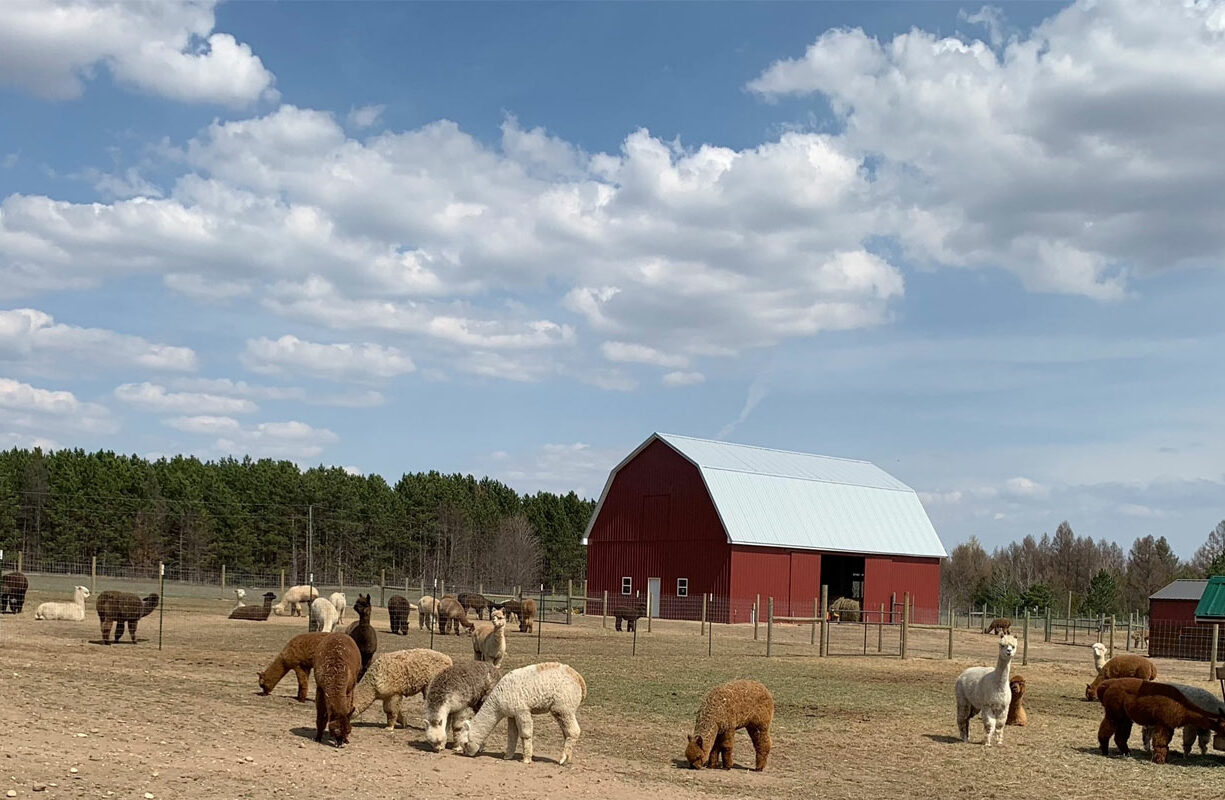
Thank you for the information that you have provided . I appreciated they way you organized and presented it . Very helpful.
Great information. Thank you.
Love the breakdown and how you put this article together!
Can alpacas coexist with any species of large tortoise?
Wanting to get both on our property, but am afraid of diseases and and parasites possibly hurting each other.
That is a great question and one I do not have an answer for. You’d need to check with an experienced alpaca vet or teach university for that answer!
Our neighbor’s have sheep and they routinely visit our front yard to eat the grass. My alpacas live near where the sheep like to visit, but there is a fence that separates them. I am concerned about the spreading of disease from my neighbor’s farm and our farm. Your article answered many questions. Thank you.
There are parasites that can travel on or in a host that could reach your alpacas. For instance, meningial worm is ingested by snails and the snail travels (up to a football field a day) to your paddocks. The alpaca then eats grass with the snails on it. Another example is you! When you walk your footwear picks up infected feces and deposits it everywhere. So yes, I’d think the sheep being on you’re property could bring in parasites that are harmful to your alpacas.
Thank you so much for this information. I have wanted my own little alpaca herd for years and it looks like we are going to make it happen here in far East Tennessee. I read through all of your advice and then saw that you are in Traverse City! I was born and raised there, left when I was 24, spent 35 years in central Texas, and moved to Tennessee in 2021. The mild weather in this particular spot seems perfect for alpaca, but I’m still researching to make sure we get all the other things right to keep our future alpaca happy and healthy. I found your blog because I googled whether or not alpaca could co-exist with peacocks. How many alpaca do you have and how much acreage do you have?
Our number of alpacas is fluid because we have births and sales each year. Right now we are 43, but we have ten babies coming in spring through fall. We live on 27 acres on the border of Buckley and Thompsonville. In true country style, our farm is physically in Buckley, but the mailbox is across the road in Thompsonville, so we have a Thompsonville address. Country life is funny sometimes.
Mentoring new farms? I love that idea!